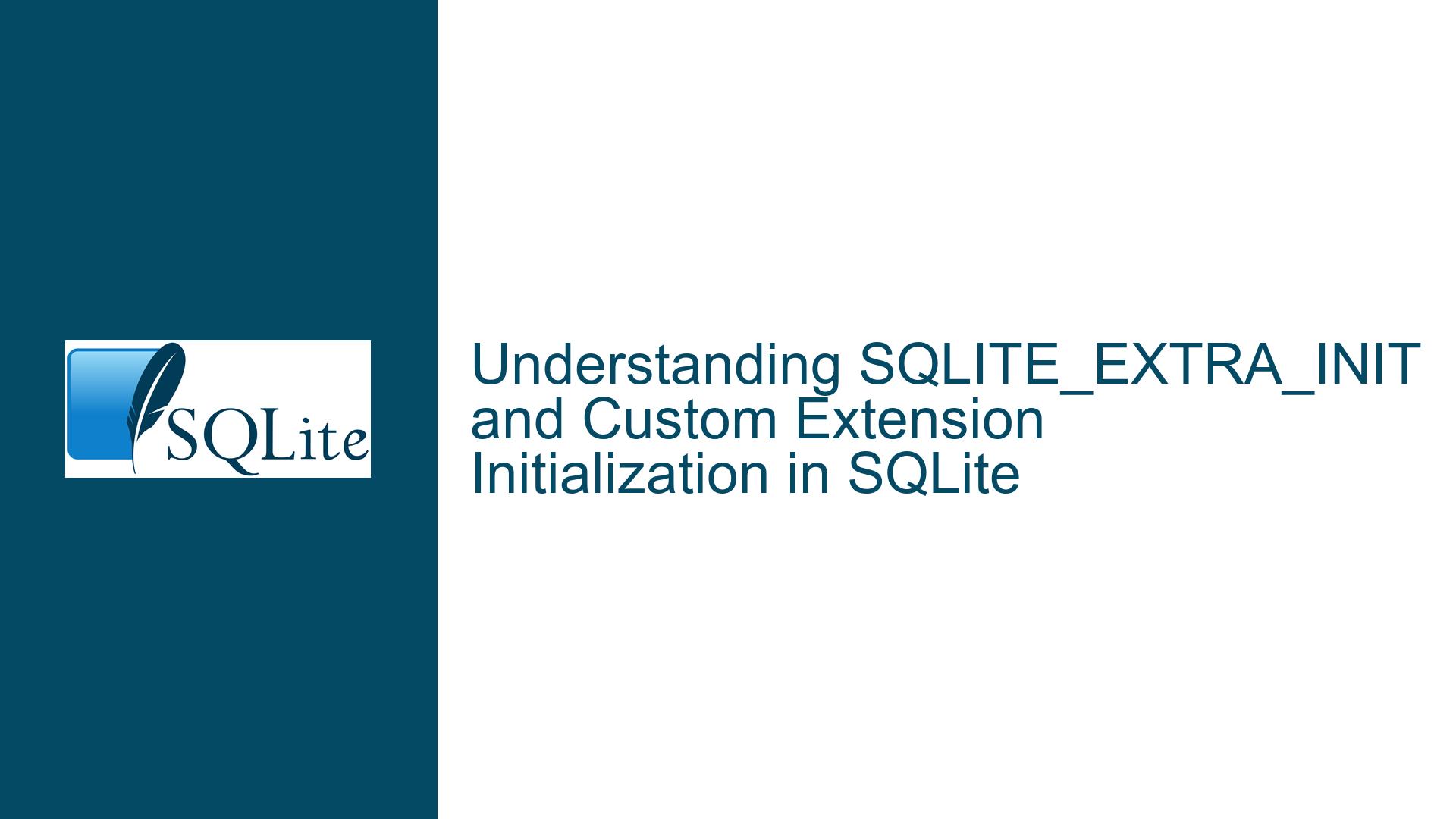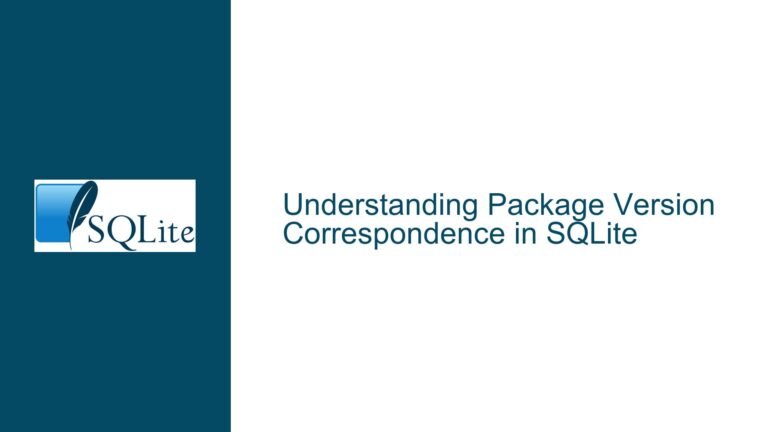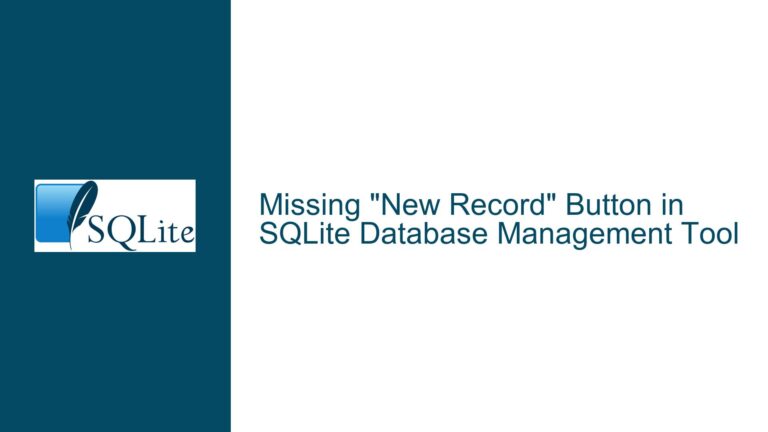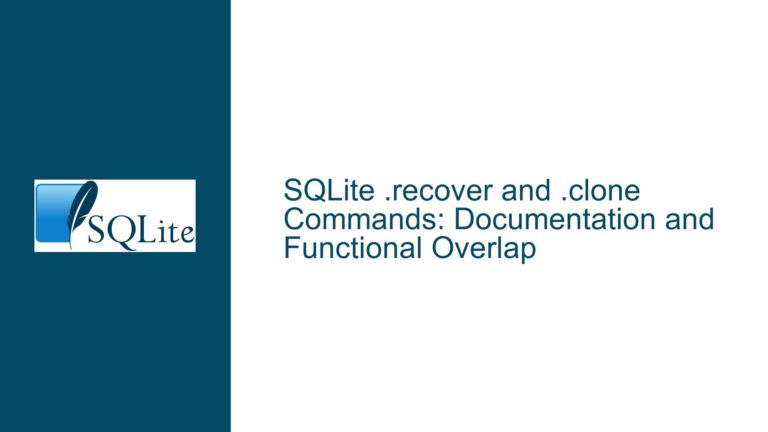SQLITE_EXTRA_INIT and Custom Extension Initialization in SQLite
SQLITE_EXTRA_INIT Directive and Its Role in SQLite Extensions
The SQLITE_EXTRA_INIT directive is a lesser-known but powerful feature in SQLite that allows developers to customize the initialization process of SQLite extensions. This directive is particularly useful when integrating multiple extensions into a single SQLite build, as it provides a centralized mechanism to register and initialize these extensions automatically. However, the lack of official documentation on SQLITE_EXTRA_INIT has led to confusion among developers, especially those who are new to SQLite’s extension system.
SQLite extensions are add-ons that enhance the core functionality of SQLite by introducing new features such as virtual tables, custom SQL functions, or specialized data types. These extensions are typically implemented as separate C source files and need to be initialized before they can be used. The SQLITE_EXTRA_INIT directive simplifies this process by allowing developers to define a custom initialization function that registers all desired extensions at once.
The core of the issue lies in the fact that SQLITE_EXTRA_INIT is not officially documented, which means developers must rely on community knowledge or trial and error to understand its usage. This lack of documentation is intentional, as it allows the SQLite development team to maintain flexibility in modifying or removing the directive without breaking compatibility guarantees. However, this also means that developers must exercise caution when using SQLITE_EXTRA_INIT, as future versions of SQLite may change or deprecate it.
Challenges in Loading SQLite Extensions Without SQLITE_EXTRA_INIT
One of the primary challenges developers face when working with SQLite extensions is the complexity of loading and initializing them without the SQLITE_EXTRA_INIT directive. Traditionally, extensions must be loaded dynamically at runtime using the sqlite3_load_extension API or compiled directly into the SQLite amalgamation. Both approaches have their limitations.
When using sqlite3_load_extension, developers must ensure that the extension is available as a shared library and that the SQLite instance is compiled with extension loading enabled. This can be problematic in environments where shared libraries are not supported or where security restrictions prevent dynamic loading. Additionally, this approach requires explicit calls to load each extension, which can become cumbersome when dealing with multiple extensions.
Compiling extensions directly into the SQLite amalgamation avoids the need for dynamic loading but introduces its own set of challenges. Developers must manually register each extension’s initialization function, which can lead to code duplication and increased complexity. This is where SQLITE_EXTRA_INIT shines, as it provides a centralized mechanism to register all extensions in a single function.
The absence of SQLITE_EXTRA_INIT documentation forces developers to rely on community-driven examples and workarounds. For instance, the example provided in the discussion shows how to use SQLITE_EXTRA_INIT to register multiple extensions, including eval, carray, btreeinfo, and series. This approach simplifies the initialization process but requires a deep understanding of SQLite’s internal APIs, such as sqlite3_auto_extension.
Best Practices for Using SQLITE_EXTRA_INIT and Ensuring Compatibility
To effectively use SQLITE_EXTRA_INIT while minimizing the risk of compatibility issues, developers should follow a set of best practices. First and foremost, it is essential to understand that SQLITE_EXTRA_INIT is not a public API and is subject to change. Therefore, any code that relies on this directive should be treated as experimental and thoroughly tested against the target SQLite version.
One recommended approach is to encapsulate the SQLITE_EXTRA_INIT logic in a separate source file that can be easily modified or replaced if the directive changes. For example, developers can create a file named extra_init.c that contains the custom initialization function and includes the necessary extension headers. This file can then be appended to the SQLite amalgamation, as shown in the discussion.
Here is an example of how to structure the extra_init.c file:
#include "sqlite3.h"
#include "eval.c"
#include "carray.c"
#include "btreeinfo.c"
#include "series.c"
int core_init(const char* dummy) {
int nErr = 0;
nErr += sqlite3_auto_extension((void(*)())sqlite3_eval_init);
#ifndef SQLITE_OMIT_VIRTUALTABLE
nErr += sqlite3_auto_extension((void(*)())sqlite3_carray_init);
nErr += sqlite3_auto_extension((void(*)())sqlite3_btreeinfo_init);
nErr += sqlite3_auto_extension((void(*)())sqlite3_series_init);
#endif
return nErr ? SQLITE_ERROR : SQLITE_OK;
}
By isolating the SQLITE_EXTRA_INIT logic, developers can easily update or replace the initialization function without affecting the rest of the codebase. Additionally, this approach makes it easier to test different configurations and ensure compatibility with future SQLite versions.
Another best practice is to use conditional compilation to handle cases where SQLITE_EXTRA_INIT is not available. For example, developers can define a fallback mechanism that uses sqlite3_load_extension or manual initialization if SQLITE_EXTRA_INIT is not supported. This ensures that the application remains functional even if the directive is removed or changed in future SQLite releases.
Finally, developers should consider contributing to the SQLite community by sharing their experiences and solutions related to SQLITE_EXTRA_INIT. While the directive is not officially documented, community-driven resources can help fill the gap and provide valuable insights for other developers. By documenting their usage patterns and sharing code examples, developers can help build a collective knowledge base that benefits the entire SQLite ecosystem.
In conclusion, while SQLITE_EXTRA_INIT offers a convenient way to initialize SQLite extensions, its undocumented nature requires developers to approach it with caution. By following best practices and staying informed about potential changes, developers can leverage SQLITE_EXTRA_INIT effectively while minimizing the risk of compatibility issues.






